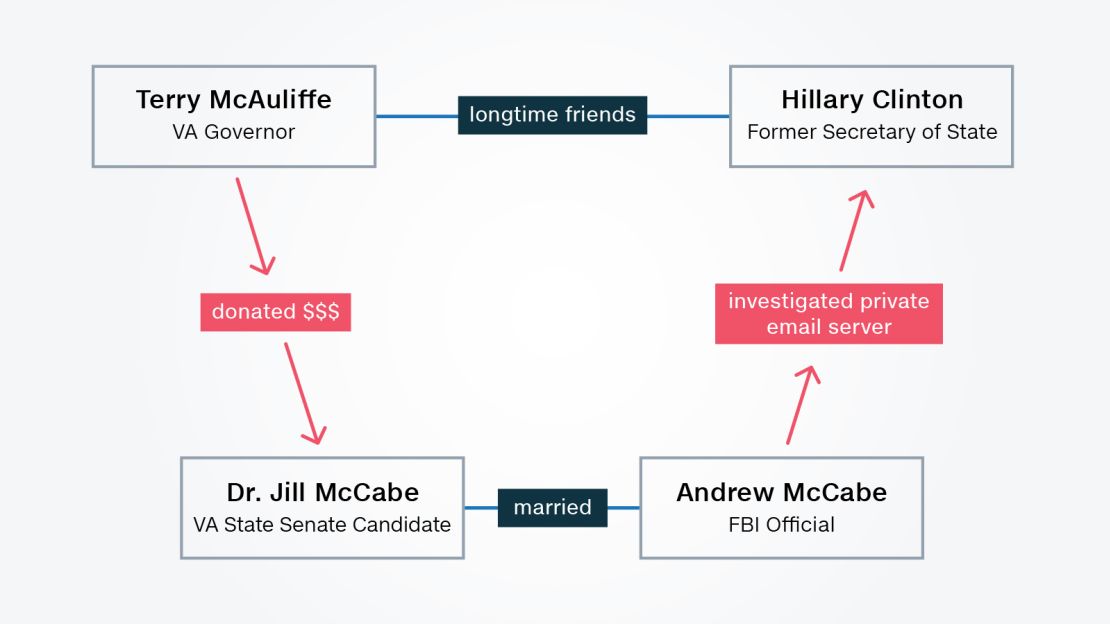Story highlights
Virginia Gov. Terry McAuliffe reportedly helped raise money for someone whose spouse is an FBI official
That official later turned out to have a role in the investigation of Clinton's use of a private email server
It was the kind of story that, at first blush, might seem like there was something fishy going on.
On Sunday night, the Wall Street Journal reported that Virginia Gov. Terry McAuliffe, a close ally of Bill and Hillary Clinton, had helped raise more than $675,000 for the campaign of a candidate whose spouse is an FBI official. That official later turned out to have a supervisory role in the investigation of Hillary Clinton’s use of a private email server for government business.
It did not take Donald Trump long to jump on the story, insisting it was a blatant example of Washington corruption.
“It was just learned that one of the closest people to Hillary Clinton, with long-standing ties to her husband and herself gave more – this just came out – gave more than $675,000 to the campaign of the spouse – the wife – of the top FBI official who helped oversee the investigation into Mrs. Clinton’s illegal email server,” Trump said Monday at a rally in St. Augustine, Florida. “So the man that was investigating her from the FBI, his wife runs for office and they give her more than $675,000 to run.”
Trump went on to say, “It’s unbelievable how Hillary Clinton got away with the email lie, the email scam, the email corruption. But now, at least, we have a pretty good idea.”
So is Trump correct? Has the Journal uncovered the latest version of Teapot Dome?
Here are the facts as presented by the Journal.
On March 7, 2015, McAuliffe, who was chairman of Hillary Clinton’s 2008 presidential campaign, and other state Democrats met with Dr. Jill McCabe, a Northern Virginia pediatrician and her husband, Andrew.
McAuliffe encouraged her to run for the Virginia state Senate. At the time, McAuliffe was pushing hard to gain a Democratic majority in the Republican-controlled state senate which had stifled much of his legislative agenda. In a statement issued this week, McAuliffe’s office said that it was “customary for the Virginia governor” to help recruit candidates.
The meeting took place five days after The New York Times revealed that Clinton had conducted State Department business on a private email account, possibly breaking Department rules.
At the time of the meeting, Andrew McCabe was head of the FBI’s field office in Washington. Among his duties was heading the effort to track down the terrorists responsible for an attack on the compound in Benghazi which killed four Americans, including Ambassador Christopher Stevens.
After the meeting with Virginia Democratic leaders, McCabe solicited advice from the bureau’s ethics office. That office advised him to avoid involvement in public corruption cases in Virginia during his wife’s candidacy and to steer clear of any of her campaign activities or events.

Starting in June and lasting through October, McAuliffe’s political action committee made six contributions totaling $467,500 to McCabe’s campaign. In addition, campaign records show that the state Democratic Party, over which McAuliffe has great influence, made two other payments totaling $207,788 in September and October 2015. Despite the governor’s support, McCabe was defeated in the November election.
It should be noted that the donations to McCabe’s campaign increased in size in September and October, several months after her husband was promoted to Associate Deputy Director of the FBI, the bureau’s number three position. But it also would be natural for the contributions to increase as the November elections drew closer.
In January, several months after his wife’s loss, Andrew McCabe was named deputy director of the FBI, the bureau’s second in command. At that point, the bureau said, “he assumed for the first time, an oversight role into Secretary Clinton’s emails.”
Given the incestuous nature of Washington D.C. culture, where it seems everyone in a position of power is married to someone else in a position of power, one could hardly be blamed for thinking something funny went on. That suspicion probably was heightened by McCabe’s decision not to recuse himself from the Clinton email investigation despite his wife’s connection to McAuliffe.
But for Trump’s suggestion of a conspiracy to be true, McAuliffe and the Clintons would have had to hatch the scheme to buy favor with the FBI via Andrew McCabe by convincing his wife to run for office some five months before it was first reported that the FBI was investigating whether Clinton mishandled classified information. Nor would it be known that such an investigation would be conducted out of Washington, not New York, since that was where the offending server was located.
Also, according to the FBI, contributions to McCabe’s campaign took place before her husband’s involvement in the email investigation. And that involvement began after his wife’s campaign had ended – not during her candidacy, as Trump suggests.






















